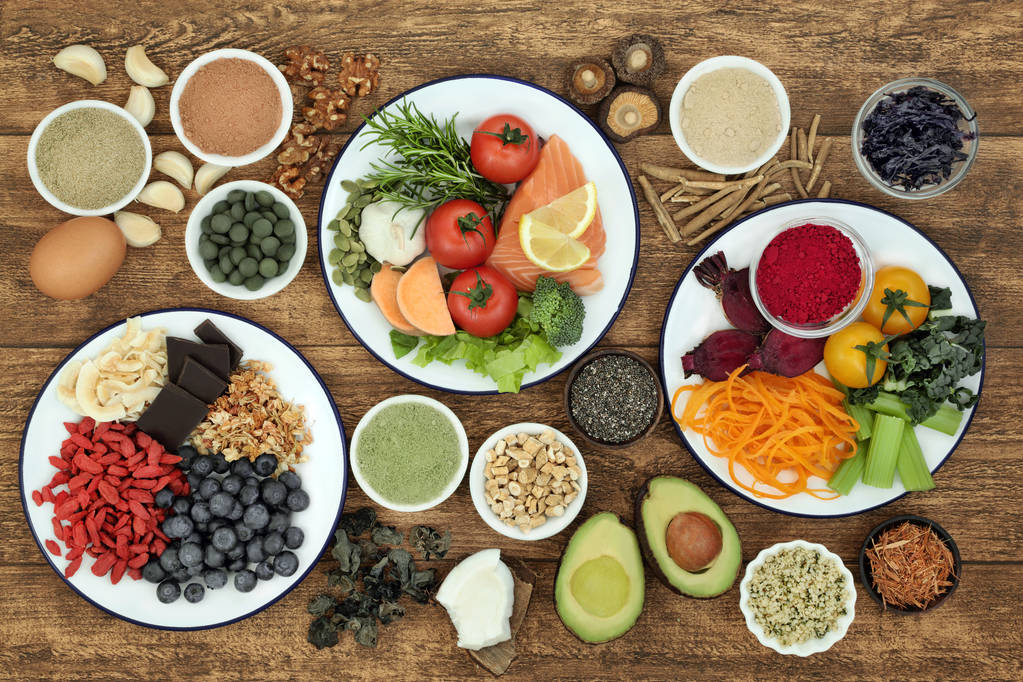Learn about the top foods that can boost your brain health and enhance cognitive function.
Discovering Foods That Support Brain Health
Have you ever stopped to think about how the food you eat affects your brain? It turns out that the old saying, “you are what you eat,” holds true when it comes to your noodle’s well-being. Your brain relies on a healthy diet to function at its best, and certain foods have been found to have a positive impact on brain health. So, let’s dive in and explore the fascinating connection between diet and brain health!

Understanding the Connection Between Diet and Brain Health
When it comes to keeping your brain in tip-top shape, the food you put on your plate plays a crucial role. Research has shown that what we eat can influence our cognitive function, memory, and overall brain health. This exciting field of study has revealed that certain nutrients have a direct impact on our brains, while poor nutrition can lead to cognitive decline.
But what exactly are these nutrients, and how do they affect our brain? Let’s take a closer look.
The Role of Nutrients in Cognitive Function
Did you know that the food you consume can directly affect your cognitive function? It’s true! Nutrients like omega-3 fatty acids, B vitamins, and antioxidants have been found to support brain health.
Omega-3 fatty acids, commonly found in fatty fish like salmon and mackerel, are essential for brain development and function. They help build cell membranes in the brain and have been linked to improved cognitive performance and a reduced risk of age-related cognitive decline.
B vitamins, such as B6, B12, and folic acid, are crucial for brain health as they play a role in the production of neurotransmitters, the chemicals that transmit signals in the brain. These vitamins can be found in a variety of foods, including leafy greens, legumes, and fortified cereals.
Antioxidants, found in colorful fruits and vegetables, help protect the brain against oxidative stress. Oxidative stress occurs when there is an imbalance between harmful free radicals and the body’s ability to neutralize them. By reducing oxidative stress, antioxidants promote optimal brain function and may even help prevent age-related cognitive decline.
How Poor Nutrition Affects the Brain
On the flip side, poor nutrition can lead to detrimental effects on your brain health. Diets high in saturated fats, refined sugars, and processed foods have been linked to cognitive decline and an increased risk of neurodegenerative diseases.
Saturated fats, commonly found in red meat, butter, and full-fat dairy products, can increase inflammation in the body, including the brain. Chronic inflammation has been associated with cognitive decline and an increased risk of conditions like Alzheimer’s disease.
Refined sugars, such as those found in sugary drinks and processed snacks, can lead to spikes in blood sugar levels, followed by crashes. These fluctuations can impair cognitive function and contribute to brain fog and difficulty concentrating.
Processed foods, which are often high in unhealthy fats, sugars, and additives, provide little nutritional value and can leave your brain starved for the essential nutrients it needs to function optimally. It’s like putting low-grade gasoline in a luxury car – your brain deserves better!
So, the next time you sit down for a meal, remember that you’re not just fueling your body – you’re fueling your brain. Choose nutrient-dense foods that support brain health and help keep your cognitive function sharp for years to come.
Key Nutrients for Optimal Brain Health
To keep your brain firing on all cylinders, it’s essential to make sure you’re fueling it with the right nutrients. Let’s take a closer look at three key players in the game of brain health: omega-3 fatty acids, B vitamins, and antioxidants.
Omega-3 Fatty Acids and Brain Function
Omega-3 fatty acids are like superheroes for your brain. They support brain cell structure, reduce inflammation, and promote healthy blood flow to the brain. Cold-water fatty fish, like salmon and sardines, are excellent sources of these brain-boosting fats.
In addition to their structural support, omega-3 fatty acids also play a crucial role in brain function. They are involved in the production and maintenance of neurotransmitters, which are chemical messengers that allow communication between brain cells. By ensuring an adequate intake of omega-3 fatty acids, you can help support optimal cognitive function, memory, and overall brain health.
Furthermore, research has shown that omega-3 fatty acids may have a protective effect against age-related cognitive decline and neurodegenerative diseases such as Alzheimer’s and Parkinson’s. These essential fats have been found to reduce the accumulation of beta-amyloid plaques, which are characteristic of Alzheimer’s disease, and to promote the clearance of toxic proteins in the brain.
The Importance of B Vitamins for the Brain
Did you know that B vitamins are essential for energy production in the brain? They also play a vital role in neurotransmitter synthesis, which is crucial for mood regulation and cognitive function. Load up on leafy greens, legumes, and whole grains to give your brain the B vitamins it craves.
In addition to their energy-producing role, B vitamins are involved in various other brain functions. For example, vitamin B12 is necessary for the formation of myelin, a protective sheath around nerve fibers that allows for efficient communication between brain cells. Deficiencies in B vitamins, particularly vitamin B12, can lead to neurological symptoms such as memory problems, confusion, and even mood disorders.
Moreover, B vitamins, including folate (B9), have been linked to a reduced risk of age-related cognitive decline and dementia. Studies have shown that individuals with higher levels of folate in their blood have better cognitive performance and a lower risk of developing cognitive impairment.
Antioxidants: The Brain’s Best Friend
Antioxidants have a powerful defense mechanism against oxidative stress, which can damage brain cells. Colorful berries, with their high antioxidant content, are like little brain protectors. Additionally, nuts and seeds, with their vitamin E and omega-3 content, are great brain-boosting snacks.
Oxidative stress occurs when there is an imbalance between the production of harmful free radicals and the body’s ability to neutralize them with antioxidants. The brain is particularly vulnerable to oxidative stress due to its high oxygen consumption and abundance of polyunsaturated fatty acids, which are prone to oxidation.
By consuming a diet rich in antioxidants, you can help protect your brain from oxidative damage and support its overall health. Berries, such as blueberries, strawberries, and raspberries, are packed with antioxidants like anthocyanins, which have been shown to improve brain function and delay age-related cognitive decline.
Furthermore, nuts and seeds are not only a great source of healthy fats but also provide a significant amount of vitamin E, another potent antioxidant. Vitamin E helps protect cell membranes, including those of brain cells, from oxidative damage, thus preserving their integrity and function.
In conclusion, ensuring an adequate intake of omega-3 fatty acids, B vitamins, and antioxidants is crucial for optimal brain health. By incorporating foods rich in these nutrients into your diet, you can support brain function, protect against cognitive decline, and promote overall cognitive well-being.
Foods That Boost Brain Health
If you’re wondering which foods specifically support brain health, we’ve got you covered. Let’s explore three brain-boosting superstars that you’ll want to add to your grocery list.
Fatty Fish: A Rich Source of Omega-3
When it comes to omega-3 fatty acids, fatty fish is where it’s at. Look for delicious options like salmon, trout, and mackerel. Not only will you be treating your taste buds, but you’ll also be giving your brain some serious love.
Fatty fish, such as salmon, is not only a tasty addition to your diet but also a fantastic source of omega-3 fatty acids. Omega-3s are essential for brain health and have been linked to improved memory and cognitive function. These fatty acids help build cell membranes in the brain and reduce inflammation, which can protect against age-related decline and enhance overall brain health.
Additionally, fatty fish is rich in nutrients like vitamin D, which is crucial for maintaining brain health. Vitamin D deficiency has been associated with an increased risk of cognitive impairment and dementia. By including fatty fish in your diet, you can ensure you’re getting a good dose of this essential nutrient.
Berries and Their Antioxidant Power
When it comes to brain health, think berries – blueberries, strawberries, and blackberries, oh my! These little powerhouses of antioxidants will not only satisfy your sweet tooth but also keep your brain sharp and focused.
Berries are not only delicious but also packed with antioxidants that can benefit your brain health. Antioxidants help protect the brain from oxidative stress and inflammation, which are known to contribute to age-related cognitive decline and neurodegenerative diseases.
Blueberries, in particular, have been shown to improve memory and cognitive function. They contain flavonoids called anthocyanins, which have been found to accumulate in the brain and improve communication between brain cells. Strawberries and blackberries are also rich in antioxidants and provide similar brain-boosting benefits.
The Brain-Boosting Benefits of Nuts and Seeds
Snack time just got brain-healthy! Nuts and seeds, such as almonds, walnuts, flaxseeds, and chia seeds, are chock-full of omega-3 fatty acids, antioxidants, and vitamin E. Sprinkle them on your yogurt, toss them into your salad, or enjoy them on their own to give your gray matter a boost.
Nuts and seeds are not only convenient and delicious snacks but also excellent sources of nutrients that support brain health. Almonds, for example, are packed with vitamin E, which is known to protect brain cells from oxidative stress. Vitamin E has been linked to a reduced risk of cognitive decline and Alzheimer’s disease.
Walnuts, on the other hand, are rich in omega-3 fatty acids, which are essential for brain health. These healthy fats have been shown to improve cognitive function and support overall brain health. Flaxseeds and chia seeds are also great sources of omega-3s, as well as antioxidants, which can help reduce inflammation and promote optimal brain function.
Adding nuts and seeds to your diet is an easy and tasty way to boost your brain health. Sprinkle them on your yogurt or oatmeal, toss them into your salads, or enjoy them as a quick and nutritious snack.
Incorporating Brain-Healthy Foods into Your Diet
Now that you know which foods are beneficial for your brain, it’s time to start incorporating them into your diet. Here are some simple tips to help you make brain-healthy choices the norm:

Simple Tips for a Brain-Healthy Grocery List
- Load up on colorful fruits and vegetables to get a wide variety of vitamins and antioxidants.
- Opt for whole grains like quinoa, brown rice, and oats instead of refined grains.
- Choose lean proteins like poultry, fish, and beans to support brain cell growth and repair.
- Include healthy fats from sources like avocados, nuts, and olive oil.
- Stay hydrated by drinking plenty of water throughout the day.
Delicious and Nutritious Brain-Boosting Recipes
No boring salads here! We’ve curated a collection of mouth-watering recipes packed with brain-boosting ingredients. From antioxidant-rich smoothie bowls to omega-3-packed salmon dishes, these recipes will make healthy eating a joy for your taste buds and your brain!
The Impact of Hydration on Brain Health
We often hear about the importance of hydration for our bodies, but did you know that staying hydrated is also essential for your brain’s well-being? Let’s dive into the role of water in brain function.
The Role of Water in Brain Function
Just like the rest of your body, your brain needs water to function optimally. It helps transport essential nutrients and oxygen to the brain cells, regulates body temperature, and flushes out toxins. So, don’t forget to quench your brain’s thirst!
Hydrating Foods for a Healthy Brain
If you’re not a fan of chugging water all day, fear not! You can also stay hydrated by incorporating hydrating foods into your diet. Foods like cucumbers, watermelon, celery, and oranges contain high water content and can contribute to your brain’s hydration.
In conclusion, nourishing your brain with the right foods is a delicious way to support optimal brain health. By including omega-3 fatty acids, B vitamins, antioxidants, and staying hydrated, you can give your brain the care and attention it deserves. So, start exploring brain-boosting recipes and make your grocery list a brain-healthy one today! Your taste buds and your brain will thank you.








Good day! Do you know if they make any plugins to help with SEO?
I’m trying to get my site to rank for some targeted keywords but I’m not seeing very good success.
If you know of any please share. Thank you! You can read similar text here:
Eco product
Thanks for sharing. I read many of your blog posts, cool, your blog is very good.
Can you be more specific about the content of your article? After reading it, I still have some doubts. Hope you can help me.